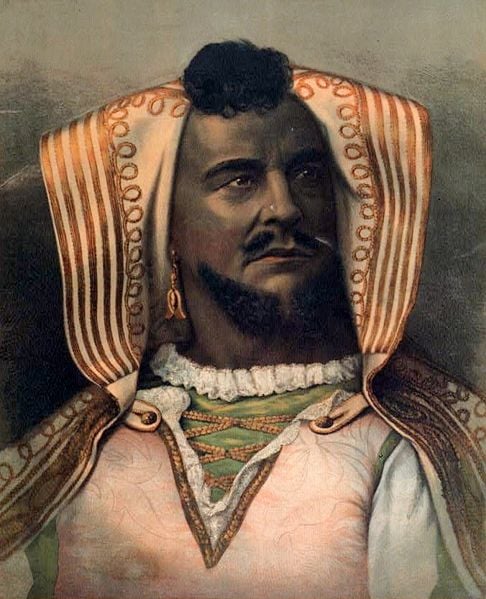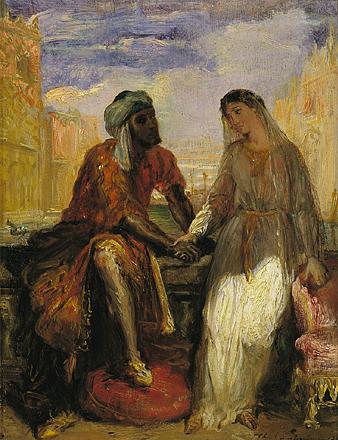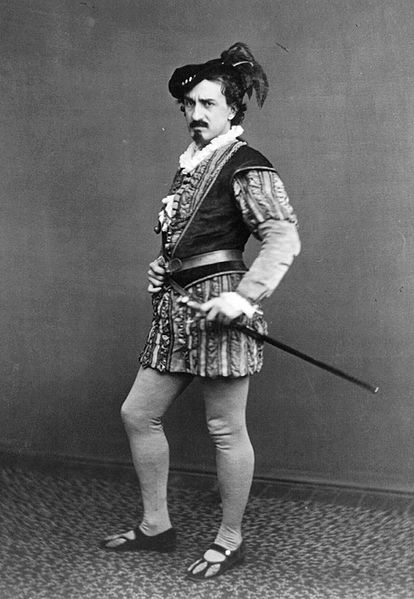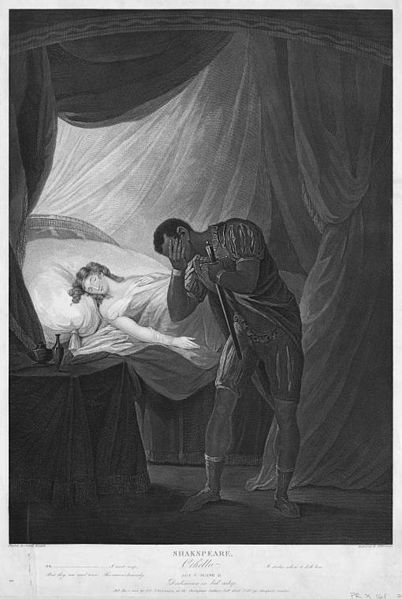Othello Race Quotes
Citations follow this format: (Act.Scene.Line). Line numbers correspond to the Norton edition.
Quote #1
IAGO
Even now, now, very now, an old black ram
Is tupping your white ewe. Arise, arise!
Awake the snorting citizens with the bell,
Or else the devil will make a grandsire of you.
Arise, I say! (1.1.97-101)
Iago uses racist slurs when he wakens Brabantio with the
news that his daughter, Desdemona (a white Venetian), has eloped with
Othello (an older, black man). When Iago says an "old black ram"
(Othello) is "tupping" (sleeping with) Brabantio's "white ewe"
(Desdemona), he plays on Elizabethan notions that black men have an
animal-like, hyper-sexuality. This seems geared at manipulating
Brabantio's fears of miscegenation (when a couple "mixes races" through
marriage and/or sex).
History Snack: It's also important to note that, although Othello is probably a Christian, Iago calls him "the devil," playing on a sixteenth century idea that black men were evil and that the devil often took the shape and form of a black man. Check out what Reginald Scott had to say in his famous 1584 book, The Discovery of Witchcraft: "Bodin alloweth the divell the shape of a black moore, and as he saith, he used to appear to Mawd Cruse, Kate Darey, and Jon Harviller." (Later, it's no surprise that Brabantio will accuse Othello of using black magic to woo Desdemona.)
History Snack: It's also important to note that, although Othello is probably a Christian, Iago calls him "the devil," playing on a sixteenth century idea that black men were evil and that the devil often took the shape and form of a black man. Check out what Reginald Scott had to say in his famous 1584 book, The Discovery of Witchcraft: "Bodin alloweth the divell the shape of a black moore, and as he saith, he used to appear to Mawd Cruse, Kate Darey, and Jon Harviller." (Later, it's no surprise that Brabantio will accuse Othello of using black magic to woo Desdemona.)
Quote #2
BRABANTIO
This is Venice. My house is not a grange.
[…]
IAGO
Because we come to
do you service and you think we are ruffians, you'll
have your daughter covered with a Barbary horse,
you'll have your nephews neigh to you, you'll have
coursers for cousins and jennets for germans.
[…]
I am one, sir, that comes to tell you your daughter
and the Moor are now making the beast with
two backs. (1.1.119; 123-127; 129-131)
We've seen how Iago uses animal imagery in his racist
diatribe against Othello, which is grounded in the idea that black men
(and women) are inhuman. Here, Brabantio objects to Iago's
middle-of-the-night assertions that Desdemona has eloped by saying his
house isn't a "grange" (a farm or a farmhouse). Iago takes the
opportunity to pun on the term "grange," as he claims that Desdemona is
having sex with a "barbary horse" and, as a result, Brabantio will have
relatives that "neigh to him." Desdemona and Othello, he says, are
"making the beast with two backs" (in other words, humping,
like camels). This isn't the first time Iago has implied that Othello's
animal-like sexuality corrupts Desdemona. Compare this to 1.1.106-113
above.
Quote #3
BRABANTIO
She, in spite of nature,
Of years, of country, credit, every thing,
To fall in love with what she feared to look on!
It is a judgment maimed and most imperfect
That will confess perfection so could err
Against all rules of nature, (1.3.114-119)
Desdemona's father argues that her love for Othello is
unnatural, since, according to him, Desdemona would never fall for a
black man who she "fear'd to look on." Of course, Brabantio couldn't be
more wrong about his daughter – Desdemona is in love Othello.
It seems that Iago has played Brabantio perfectly. Iago knew that
Brabantio was racist and, as previous passages demonstrate, he used
Brabantio's attitude toward the idea of a mixed marriage in order to
rile the man against Othello. Brabantio repeatedly insists that Othello
must have "enchanted" Desdemona with "foul charms" and magic spells.
Otherwise, he insists, Desdemona never would never have run "to the
sooty bosom" of Othello (1.2.70).

The Issue of Race
People
discriminate for many different reasons: fear, envy, the desire for
power, or a need to disassociate themselves from others. They can, thus,
use someone's skin color (an innate trait that cannot be altered) to
express their hatred.
Othello, in Shakespeare’s play Othello, is a happily married and widely respected general in the Venetian army despite his African heritage. In the beginning of the story, Othello has not, as yet, experienced discrimination. However, Iago succeeds in bringing about the ruin of Othello and his wife Desdemona by revealing to Othello the existence of racist ideas and convincing him that he must act out against the individuals supposedly harboring racist-fueled resentment.
Through Iago’s manipulation of Othello and others, his claim comes to pass. In the end, people use the color of Othello's skin to condemn his erratic behavior. And by his believing that racism exists, Othello also creates it.
Othello, in Shakespeare’s play Othello, is a happily married and widely respected general in the Venetian army despite his African heritage. In the beginning of the story, Othello has not, as yet, experienced discrimination. However, Iago succeeds in bringing about the ruin of Othello and his wife Desdemona by revealing to Othello the existence of racist ideas and convincing him that he must act out against the individuals supposedly harboring racist-fueled resentment.
Through Iago’s manipulation of Othello and others, his claim comes to pass. In the end, people use the color of Othello's skin to condemn his erratic behavior. And by his believing that racism exists, Othello also creates it.
Othello's Background
Othello
is an African prince, born into privilege and royalty. He claims, “I
fetch my life and being/From men of royal siege.” (III.iii. 21-22). He
left his native homeland and his life of guaranteed luxury to live among
white Europeans and be free of the innate obligations of royalty. In
his new home, his only obligations are to people he himself has chosen
to serve: the Venetian government and his wife Desdemona. Even in this
position as general, Othello still experiences freedom since he can
retire at his leisure, and he tells Iago:
But that I love the gentle Desdemona,
I would not my unhoused free condition
Put into circumscription and confine
For the sea’s worth (I.ii.27-28).
This statement suggests that if he had not met Desdemona, Othello would have continued to live life in a “free condition” without matrimonial commitments that “put into circumscription and confine” his freedom.
Othello delights in and experiences the ultimate freedom to do as he pleases. He is free to make the choices that ultimately affect his life, and enjoys his self-made position. The color of his skin has not prevented him from achieving a high rank in society and exercising the power and freedom such a position entails.
But that I love the gentle Desdemona,
I would not my unhoused free condition
Put into circumscription and confine
For the sea’s worth (I.ii.27-28).
This statement suggests that if he had not met Desdemona, Othello would have continued to live life in a “free condition” without matrimonial commitments that “put into circumscription and confine” his freedom.
Othello delights in and experiences the ultimate freedom to do as he pleases. He is free to make the choices that ultimately affect his life, and enjoys his self-made position. The color of his skin has not prevented him from achieving a high rank in society and exercising the power and freedom such a position entails.

A Plot Rooted in Jealousy
These
achievements have earned Othello the respect and admiration of those
around him with the exception of a resentful few, including Iago and
Roderigo. Iago hates Othello because he appointed the inexperienced
Cassio as his lieutenant instead of Iago, who instead became his
“ancient.” Iago enacts his revenge upon Othello by manipulating
Roderigo, who desires Othello’s wife Desdemona. Roderigo expresses his
jealousy by calling Othello racial slurs: “What a full fortune does the
thick-lips owe/If he can carry ‘t thus!” (I.i.65-66). Both men plot to
bring an end to Othello’s marriage by telling Desdemona’s father,
Brabantio, that Othello kidnapped her.
They succeed in angering her father when they bring up the subject of race. Iago says to Brabantio, “An old black ram/Is tupping your white ewe” (I.i.87-88). With this saying, Iago and Roderigo hint that Othello and Desdemona’s future children will be half-breeds who will become the ridicule of society and bring shame upon Brabantio. They continue by saying, “You’ll have your daughter covered with a Barbary/Horse; you’ll have your nephews neigh to you; you’ll have coursers for cousins and gennets for germans” (I.i.110-12).
They succeed in angering her father when they bring up the subject of race. Iago says to Brabantio, “An old black ram/Is tupping your white ewe” (I.i.87-88). With this saying, Iago and Roderigo hint that Othello and Desdemona’s future children will be half-breeds who will become the ridicule of society and bring shame upon Brabantio. They continue by saying, “You’ll have your daughter covered with a Barbary/Horse; you’ll have your nephews neigh to you; you’ll have coursers for cousins and gennets for germans” (I.i.110-12).
Is Racism Fabricated?
Afraid
that such events would jeopardize his position as senator, Brabantio
accuses Othello of kidnapping and bewitching his daughter in a desperate
attempt to retain his own power and honor in the eyes of society. In
his defense, Othello points out that in the past Brabantio “lov’d me;
oft invited me” (I.iii.128), showing that Brabantio was not racist and
did not discriminate against Othello until Iago's interference made him
feel it was in his best political interests to do so.
Desdemona acquits Othello of any wrongdoing, and the Duke says to Brabantio: “If virtue no delighted beauty lack/Your son-in-law is far more fair than black” (I.iii.288-89). The Duke tells Brabantio that he should not put importance on Othello’s skin color, but on his virtuous deeds and nature instead.
Desdemona acquits Othello of any wrongdoing, and the Duke says to Brabantio: “If virtue no delighted beauty lack/Your son-in-law is far more fair than black” (I.iii.288-89). The Duke tells Brabantio that he should not put importance on Othello’s skin color, but on his virtuous deeds and nature instead.

Othello Starts to Believe That Racism Exists
Othello,
himself, is unaware of any existing racism or of the power of such
thoughtless hatred. He declares, “My parts, my title and my perfect
soul/Shall manifest me rightly” (I.ii.31-32). He does not believe that
discrimination can determine his guilt. At first, this notion of
universal equality works against Iago’s claims that Desdemona is
cheating on Othello because of his skin color. Othello confidently
declares, “Nor from mine own weak merits will I draw/The smallest fear
or doubt of her revolt/For she had eyes, and chose me” (III.iii.187-89).
However, he goes on to say, “And yet, how nature erring from itself—” (III.iii.228). This indicates that, perhaps deep down, Othello believes that it is in Desdemona’s inherent nature to favor men of her own race. Iago draws upon Othello's doubt and says, “Her will, recoiling to her better judgment/May fall to match you with her country forms/and happily repent” (III.iii.226-28). By saying this, Iago implies that Desdemona compares Othello with other white Venetian men and regrets her marriage. Persuaded by Iago's words, Othello starts to believe that Desdemona is cheating on him because he is black.
Left alone with these thoughts, Othello states “I’ld whistle her off and let her down the wind/To prey at fortune (III.iii.263-64). His words suggest that if Desdemona was proven false, he would cast her out of his household. However, after he brings up the issue of his own race and recognizes how he is different from the rest of society, Othello lashes out in anger at Desdemona, the scapegoat for his overpowering sense of self-loathing:
Haply, for I am black
And have not those soft parts of conversation
That chamberers have, or for I am declin’d
Into the vale of years (yet that’s not much)
She’s gone. I am abus’d: and my relief
Must be to loathe her (III.iii.264-69)
Othello does not just criticize Desdemona for her infidelity nor condemns her for her sins, but he, in a way, justifies her actions by assuming that his own race-related weaknesses motivated her to have an affair with another man. This quote shows a change in Othello. He begins to hate Desdemona because he now believes that she cheated on him because of his race. He will not be content with just throwing her out, but is now consumed with loathing because he believes her cheating and discrimination has caused him to feel pain and inferiority.
However, he goes on to say, “And yet, how nature erring from itself—” (III.iii.228). This indicates that, perhaps deep down, Othello believes that it is in Desdemona’s inherent nature to favor men of her own race. Iago draws upon Othello's doubt and says, “Her will, recoiling to her better judgment/May fall to match you with her country forms/and happily repent” (III.iii.226-28). By saying this, Iago implies that Desdemona compares Othello with other white Venetian men and regrets her marriage. Persuaded by Iago's words, Othello starts to believe that Desdemona is cheating on him because he is black.
Left alone with these thoughts, Othello states “I’ld whistle her off and let her down the wind/To prey at fortune (III.iii.263-64). His words suggest that if Desdemona was proven false, he would cast her out of his household. However, after he brings up the issue of his own race and recognizes how he is different from the rest of society, Othello lashes out in anger at Desdemona, the scapegoat for his overpowering sense of self-loathing:
Haply, for I am black
And have not those soft parts of conversation
That chamberers have, or for I am declin’d
Into the vale of years (yet that’s not much)
She’s gone. I am abus’d: and my relief
Must be to loathe her (III.iii.264-69)
Othello does not just criticize Desdemona for her infidelity nor condemns her for her sins, but he, in a way, justifies her actions by assuming that his own race-related weaknesses motivated her to have an affair with another man. This quote shows a change in Othello. He begins to hate Desdemona because he now believes that she cheated on him because of his race. He will not be content with just throwing her out, but is now consumed with loathing because he believes her cheating and discrimination has caused him to feel pain and inferiority.
Othello's Character Comes Into Question
As
Iago continues to supply Othello with 'proof' of Desdemona’s supposed
infidelity, Othello is further consumed with rage and jealousy. When
Lodovico comes to deliver a letter to Othello, Desdemona makes a comment
which Othello assumes is about her other lover, and he slaps her.
Lodovico is shocked at this rash behavior, which is so out of character,
and tells Othello: “My lord, this would not be believ’d in
Venice/Though I should swear I saw ‘t; ‘til very much” (IV.i.225-26). He
goes on to question Othello’s reputation after such an act, saying:
Is this the noble Moor whom our full senate
Call all in all sufficient? Is this the nature
Whom passion could not shake? Whose solid virtue
The shot of accident, nor dart of chance,
Could neither graze nor pierce? (IV.i.245-49)
Othello becomes even more rash when he calls Desdemona a whore, and Emilia, Iago’s wife, exclaims: “Here’s a change indeed!” (IV.ii.107). However, it is not until Othello commits the ultimate crime that his skin color is held against him. They condemn his race because they struggle to find a meaning for this sudden and seemingly unprovoked action.
Is this the noble Moor whom our full senate
Call all in all sufficient? Is this the nature
Whom passion could not shake? Whose solid virtue
The shot of accident, nor dart of chance,
Could neither graze nor pierce? (IV.i.245-49)
Othello becomes even more rash when he calls Desdemona a whore, and Emilia, Iago’s wife, exclaims: “Here’s a change indeed!” (IV.ii.107). However, it is not until Othello commits the ultimate crime that his skin color is held against him. They condemn his race because they struggle to find a meaning for this sudden and seemingly unprovoked action.

Murder
When
Othello murders his wife, it forces those who formerly respected and
admired him, and those who held him to be equal on all levels, to use
his skin color to explain his great misdeeds. For example, Emilia calls
him a “blacker devil!” (IV.ii.132). On the topic of Desdemona’s supposed
infidelity, Emilia states that Desdemona was true and “was too fond of
her most filthy bargain” (IV.iii.157), contemptuously referring to
Othello in racist terms. His race is now recognized and being utilized
by those who Othello alienated through his irrational actions. If he had
not been prompted through jealousy and his own sense of self-loathing,
Othello would continue to have been regarded in high esteem by the rest
of society.
Conclusion
Othello
had previously lived a life free of racial discrimination, except for
those few who envied and resented him, or feared he would sabotage their
powers. These few used his race as a means of bringing about his
destruction. For the rest of society, he was considered a noble and
virtuous general, and his color was of little consequence. However, when
Othello committed atrocious crimes because of his unfounded jealousy,
those who had previously believed him to be admirable and good condemned
him, not by criticing his character, but by criticizing his
distinguishing racial characteristic: his color.
No comments:
Post a Comment